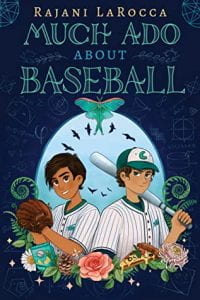 LaRocca, Rajani. Much Ado About Baseball. Yellow Jacket, 2021. 978-1-499-81101-8. 312 p. $17.99. Grades 5-8.
LaRocca, Rajani. Much Ado About Baseball. Yellow Jacket, 2021. 978-1-499-81101-8. 312 p. $17.99. Grades 5-8.
Trish is annoyed with her mother for making her move again. It’s challenging enough being a girl who plays baseball, without being the new kid too. But she is determined to make what may be her last season of baseball awesome. Until she discovers Ben, the boy she beat in last spring’s regional Math Puzzler competition, is on the team. This could be a complicated problem to solve. Ben, who is reluctantly playing ball this summer, does not need Miss Math Puzzler genius showing him up in baseball, too. So the two 12-year-olds begin the season at odds with each other, despite the efforts of Ben’s pal Abhi, who quickly befriends Trish as well. But when Ben and Trish each receive a puzzle book in the mail, they quickly realize that the team’s sudden success may be tied into their ability to solve the puzzles, and they soon pair up. But the course of true love, whether math or baseball, never did run smooth. And with the machinations of a Puck or two, there is no guarantee of a solution to this Midsummer mess. This companion book to LaRocca’s Midsummer’s Mayhem delightfully pairs baseball, math, and Shakespeare in a lighthearted plot about friendship and family, relationships that are frequently complicated. Ben, Trish, and Abhi all have frustrations with their families, as well as negotiating friendships and self-esteem issues. A community theater production of A Midsummer Night’s Dream provides the context for a bit of Puckish magic, and a few fey individuals who wish to make the mortals look foolish. Readers who are not familiar with the Bard’s work still will thoroughly enjoy the book, but those with a knowledge of the play will enjoy the subtle (and eventually not so subtle) parallels running through the story. Trish and Abhi are Indian, Ben is white.
THOUGHTS: A blending of math and baseball may not attract all readers, but one does not have to be a fan of either to enjoy the book. LaRocca enthusiastically explains both, so readers may pick up an appreciation by the end of the story.
Fantasy (Magical Realism) Nancy Nadig, Penn Manor SD
